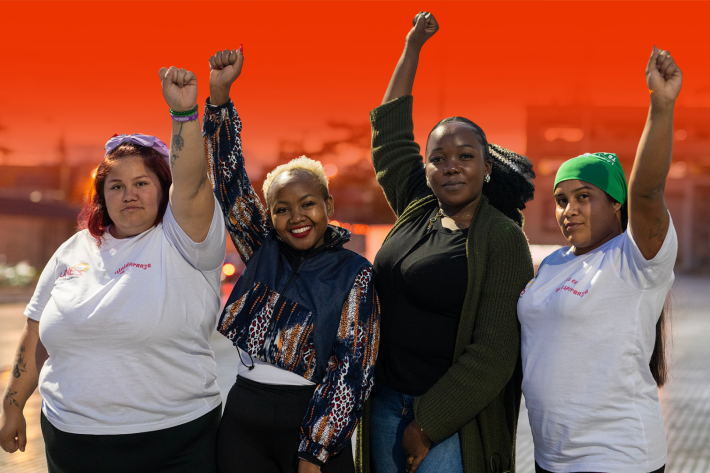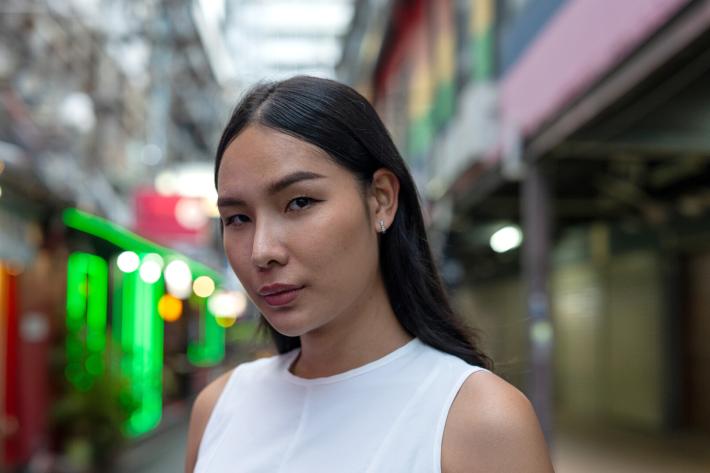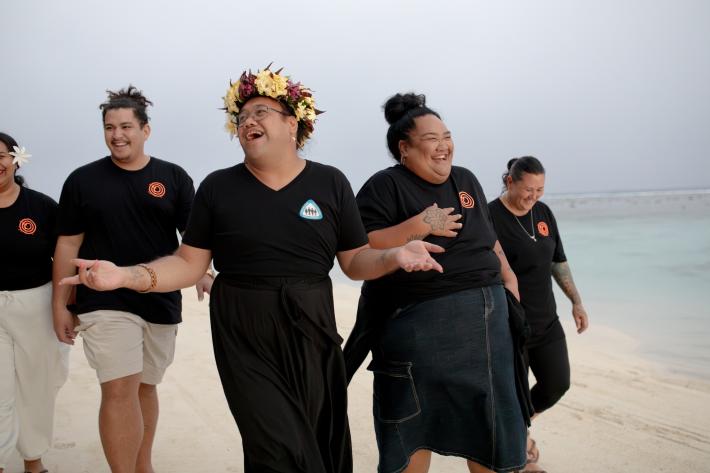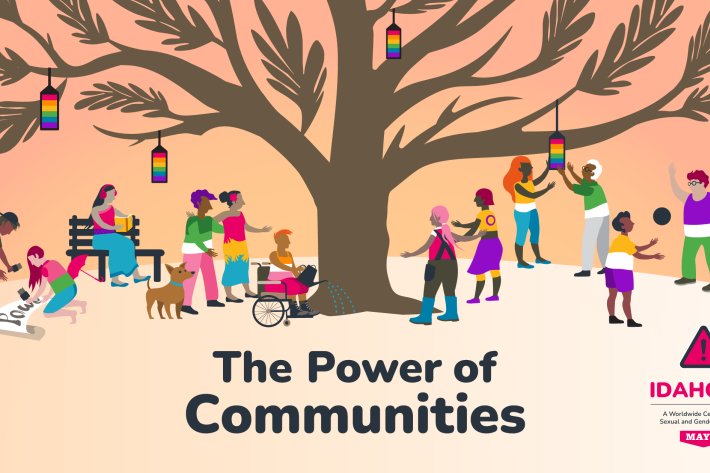
Spotlight
A selection of news from across the Federation
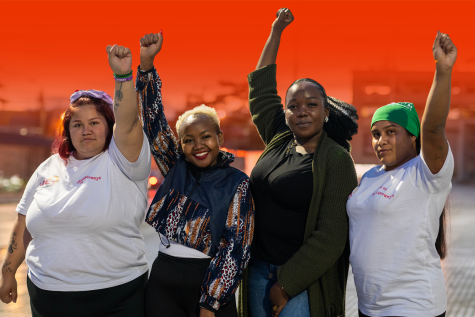
We Made It a Charter: IPPF’s Declaration of Values
Proud, bold, and united: we are values-led.
Filter our news by:


| 21 December 2021
The Lebanese Association for Family Health concludes Japan-funded project on HIV and reproductive health
On 13 December 2021, the Lebanese Association for Family Health (SALAMA) hosted a closing ceremony of its Japan Trust Fund project, "Reducing maternal mortality and morbidity related to reproductive health among Syrian refugees and the Lebanese host communities in the Bekaa", at the Movenpick Hotel in Beirut. It was attended by the representatives from the Japanese Embassy in Lebanon, the Ministry of Social Affairs, the Lebanese Order of Midwives, international organizations, and civil society groups. The event celebrated many achievements, including its reach to 6,115 people with more than 102,000 sexual and reproductive health (SRH) services, through speeches, presentations, and video documentaries. It also served as an opportunity to look back on the various challenges the project faced due to the country’s political and economic crises, the COVID-19 pandemic, and the Beirut explosion. Many reiterated the further needs in the country, particularly among those in humanitarian situations. The Japanese government has been funding SALAMA's work in the Bekaa region since 2017, and this project was the second one. President of SALAMA, Dr Joseph Challita, and the executive director, Ms Lina Sabra, expressed their deep gratitude to the Government of Japan in their speeches. The representative of the Japanese embassy responded with an acknowledgement of the relevance and good outcomes of the project. Dr Joseph Challita said: "We are gathered here today to celebrate our success in implementing this project. Let us strive together, as always, to make our voices heard by leaders and decision makers who have the ability to create an environment that facilitates equal access to contraceptives and family planning services for all women and girls." Ms Lina Sabra said: "SALAMA was committed to the priorities of Japan's official development assistance ODA policy, which focuses on empowering all marginalized groups that need services and respecting the cultures of different communities... Salama focused on contributing to the achievement of Sustainable Development Goals 3, 5, and 13." Ms Maki Yamaguchi, Embassy of Japan in Lebanon, said: "In light of the multiple crises that Lebanon is facing, it has become difficult for the Lebanese community and the Syrian refugees to access the necessary health services, hence the importance of launching successful projects." Project documentation videos: JTF end of project report HIV success story Family planning success story Pregnant women program (Mama & Baby Kits) Dignity kits
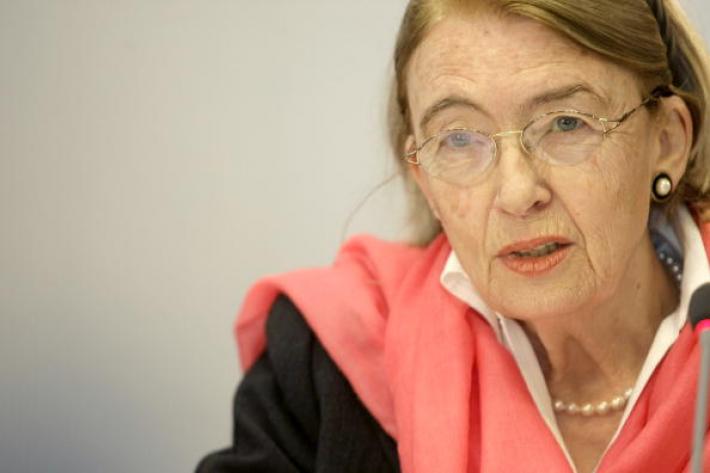
| 13 September 2021
IPPF is deeply saddened by the passing of Ingar Brüggemann, former IPPF Director-General
The International Planned Parenthood Federation (IPPF) is deeply saddened by the passing of Ingar Brüggemann, who led IPPF as its Director-General from 1995-2002. Under her leadership, she accelerated IPPF’s transition into a dynamic and progressive organization that full embraced and acted upon the 1994 International Conference of Population and Development Programme of Action in her vision and direction for the Federation. Her leadership ran until 2002 during which time she was the architect of IPPF’s landmark Charter on Sexual and Reproductive Rights, and was passionate in her promotion of young people being at the heart of IPPF’s policies and programmes. In her staunch defense of sexual and reproductive health and rights (SRHR), Ms Brüggemann was the embodiment of the ‘Brave and Angry’ movement of women leaders that overhauled the thinking and practice around population policy and sexual and reproductive health and paved the way for the next generation. Ingar was a true visionary, leader, and unapologetic disruptor in the SRHR movement, where her legacy will continue to live on through the work of IPPF. Ingar Brüggemann 3 October 1933 - 7 September 2021

| 17 August 2021
IPPF's statement on the ongoing situation in Afghanistan
On the ongoing situation in Afghanistan, IPPF’s Director-General, Dr Alvaro Bermejo, said: "The International Planned Parenthood (IPPF) is deeply concerned about the situation unfolding in Afghanistan and asks those in power to preserve the enormous gains made in life-saving sexual and reproductive healthcare for Afghan women and girls, and to continue working with the partners and NGOs that provide these services. "Equally, the UK Government retains a significant responsibility to the Afghan people and, in the words of Boris Johnson, must not turn its back on Afghanistan. Once again, IPPF implores the government to urgently reinstate critical overseas aid funding, which it deliberately chose to remove from Afghanistan when it was most needed. "We also ask the international community to stand in solidarity with the people of Afghanistan, including IPPF's partners, who, despite the dangers, continue to provide life-saving healthcare to those in need."
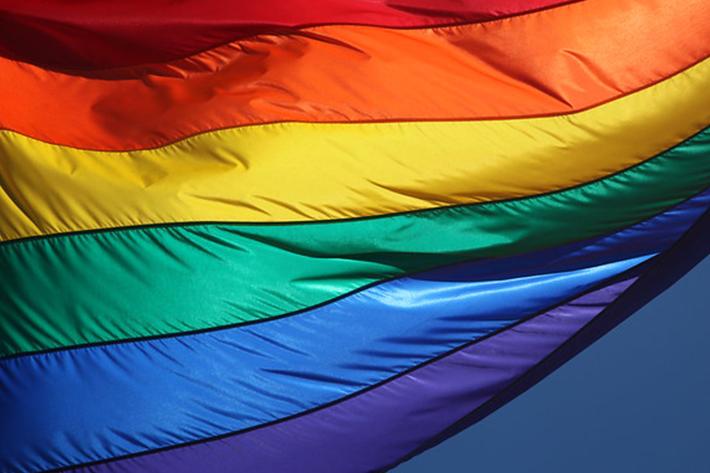
| 28 July 2021
IPPF condemns violence at Georgia’s LGBTIQ Pride event
The International Planned Parenthood Federation (IPPF) strongly condemns the violence directed towards the LGBTIQ community and media representatives earlier this month. IPPF calls on the Georgian authorities to investigate the violence, and hold all perpetrators accountable to the fullest extent of the law. IPPF is also concerned at reports of inaction by the police during the violence. On 5 July 2021, the participants of LGBTIQ Tbilisi Pride and their allies, as well as journalists covering the Pride, were unable to exercise their rights, and instead faced imminent threats to their safety. Violence against them resulted in severe injuries and the death of one journalist. Georgia’s national law prohibits all discrimination on the basis of sexual orientation or gender identity. The country has ratified the core international human rights conventions that guarantee freedom and independence of media, and bans discrimination against LGBTIQ persons, the same way they forbid discrimination based on race, sex, religion, or political conviction. The right to peaceful assembly and freedom of expression constitute key universal human rights and are assured under the Georgian Constitution. These values are enshrined in the EU-Georgia Association Agreement and the European Convention on Human Rights. Under the Association Agreement with the EU, Georgia has committed to strengthen respect for democratic principles, the rule of law and good governance, human rights and fundamental freedoms, including media freedom and the rights of persons belonging to minorities, and to contribute to consolidating domestic political reforms. Nino Tsuleiskiri, Director of HERA XXI, IPPF’s Member Association in Georgia, commented: “The direct refusal of the Ministry of Interior to address the mounting violence has resulted in a tragic escalation of violence against media representatives in the past weeks. We call on the Georgian government and authorities to assume responsibility and ensure safe and stigma free environment for every citizen of Georgia. The right to life, right to health, as well as access to safe and adequate services have been hampered by ongoing hate-motivated violent attacks on members and allies of LGBTIQ community in Georgia. All persons have a right to the enjoyment of the highest attainable standard of physical and mental health, which includes the underlying determinants of health and access to sexual health care for prevention, diagnosis and treatment of all sexual concerns, problems and disorders in a stigma free environment.” Tor-Hugne Olsen, Head of the Sexual and Gender Center of the International Planned Parenthood Federation European Network (IPPF EN) added: “For people to attain the highest standard of health, they must first be empowered to exercise choice in their sexual and reproductive lives; they must feel confident and safe in expressing their own sexual identity – this is a human right. The attack on the LGBTIQ community in Georgia shows us that there is still much work to be done to ensure those rights are realized for all. Sexuality is a natural and precious aspect of life, an essential and fundamental part of our humanity and must be protected.” Intensified rhetoric against rights increases the vulnerability of Georgia’s democracy, which already faces significant disinformation challenges. No measures have been taken by the government of Georgia to prevent or deter hate driven speech, provide sufficient protection as violent acts against activists and journalists were carried out. IPPF calls on the Georgian authorities without delay to uphold the rule of law, to investigate police inaction and violation of the right to freedom of assembly, right to health, right to life, and the bodily integrity of journalists and to bring the perpetrators to justice. Law enforcement should act swiftly to protect those exercising their Constitutional rights to freedom of expression and assembly, to protect journalists exercising freedom of the press, and to publicly condemn violence. The International Planned Parenthood Federation (IPPF) is a global service provider and advocate of sexual and reproductive health and rights for all. For over 65 years, IPPF through it Member Associations and partners, has delivered high-quality sexual and reproductive healthcare. and advocated for the advancement of sexual and reproductive rights in over 140 countries. Our Member Associations and partners are independent organizations that are locally owned, which means they can deliver care and advocate for sexual and reproductive rights, informed by local context and expertise, especially to the vulnerable and the under-served. We advocate for a world where people are provided with the information, they need to make informed decisions about their sexual and reproductive health and bodies. We stand up and fight for sexual and reproductive rights, and against those who seek to deny people their human right to bodily autonomy and freedom. We deliver care that is rooted in rights, respect, and dignity – no matter what. IPPF currently has 118 Member Associations and 13 partners.

| 16 July 2021
IPPF considers legal action against UK Government's decision to cut IPPF’s funding
London, Friday 16th July 2021 - The International Planned Parenthood Federation (IPPF) has today revealed it has sent a pre-action letter to the Government following the Foreign, Commonwealth and Development Office's (FCDO) termination of IPPF’s ACCESS project funding, based on the Government’s unlawful decision to cut the foreign aid budget. The UK's foreign aid spending is enshrined at 0.7% of GNI in the International Development (Official Development Assistance Target) Act 2015. The Government’s cuts, which reduce aid contributions to 0.5% of Gross National Income (GNI) and amount to a staggering £4.5 billion, will have a catastrophic impact on millions of the world's most vulnerable people, especially women and girls who have now been consigned to a bleak and uncertain future. Having sought legal advice, IPPF believe that the Government's unilateral decision to reduce the percentage of GNI without amending the primary legislation under the International Development (Official Development Assistance Target) Act 2015 is unlawful, making any decision of the FCDO based on the cuts unlawful too. Under the proposed aid reduction, the IPPF is expected to lose £14.2 million in funding over the next three years despite an Accountable Grant Agreement (AGA) with the FCDO to support sexual and reproductive health service delivery until December 2023. Under the AGA, the FCDO was committed to providing up to £21 million for the U.K. Aid Connect ACCESS Consortium's efforts to enhance the sexual and reproductive health rights of some of the world's most marginalised and underserved people, including those living in extreme poverty, those living in humanitarian crises and those affected by HIV and AIDS. The consortium, led by the IPPF, specifically focused on providing support to groups in Lebanon, Mozambique, Nepal and Uganda. The vote taken on Tuesday in the House of Commons was not capable of legally amending the primary legislation, a necessary step for making the cuts lawful. Unless the Government reverses its position, IPPF will proceed with filing for a judicial review. Dr Alvaro Bermejo, Director-General of the International Planned Parenthood Federation, said: "Since IPPF became aware of the Government's plans to slash the U.K.'s aid budget, it has taken every opportunity to demonstrate the unlawfulness of these cuts and the catastrophic impact they will have on millions of women, girls and marginalized people worldwide, and the thousands of lives that will be lost in the process. "Sadly, the Government has not heeded our warnings, instead choosing to terminate the ACCESS grant. This means IPPF has been forced to send a pre-action letter to the Secretary of State, seeking an urgent review of the decision. We were further disappointed with yesterday’s motion in the House of Commons to introduce long lasting changes without going through due legislative process. "IPPF has not taken this decision lightly. This action is about fighting the injustice of the Government's ruling on behalf of the women and girls we serve and honouring the intent of IPPF and its member associations." In addition to the decision IPPF is seeking to have reviewed, the Government’s unlawful cuts to the foreign aid budget have had wider effects on IPPF. In total, IPPF could lose up to £72 million in funding over the next three years despite a commitment from the FCDO to support sexual and reproductive health care delivery. The loss of funding for IPPF means massive reductions and the potential closure of the U.K.'s flagship WISH (Women's Integrated Sexual Health) programme. This hugely successful initiative delivers life-saving contraception and sexual and reproductive health services for women and girls in some of the world's poorest and most marginalized communities. If allowed to continue operating until 2023, it would prevent an additional 7.5 million unintended pregnancies, 2.7 million unsafe abortions and 22,000 maternal deaths. Without additional funding, IPPF will be forced to close services in Afghanistan, Bangladesh, Zambia, Mozambique, Zimbabwe, Cote D'Ivoire, Cameroon, Uganda, Mozambique, Nepal and Lebanon and may be forced to close services in an additional nine countries, withdrawing support for sexual and reproductive health services from approximately 4,500 service delivery points globally. Sadly, it will also mean the loss of over 480 IPPF staff supporting SRH service delivery in the FCDO supported countries. IPPF invites the Secretary of State to reinstate the aid budget and confirm the Government's commitment to the 0.7% aid target as a means of keeping its legally binding promises to millions of people worldwide. Notes to Editors: The International Planned Parenthood Federation (IPPF) is a UK based charity committed to providing sexual and reproductive support to the world's most under-served communities. The IPPF operates in 142 countries, relies on volunteers and regularly receives financial support for national governments to support their global work. Under the FCDO's unlawful reduction of UK foreign aid contributions to 0.5% of Gross National Income, the IPPF is expected to lose £14.2 million earmarked for support to vulnerable communities in Lebanon, Mozambique, Nepal and Uganda. The IPPF’s case against the Government is independently financed and no taxpayer money is being used to fund legal costs.

| 02 July 2021
IPPF announces new commitments to Sexual and Reproductive Health and Rights (SRHR) at the Generation Equality Forum
The Generation Equality Forum (GEF) is a global multi-stakeholder platform to reignite the worldwide commitment for gender equality, convened by UN Women and the governments of Mexico and France. The Forum kicked off in Mexico City, Mexico, on 29 – 31 March 2021, and culminated in Paris, France, on 30 June – 2 July 2021, with the aim of securing a set of concrete, ambitious, and transformative commitments to achieve irreversible progress towards gender equality; bringing together governments, civil society organizations, young people-led organizations, the private sector and foundations to define and announce ambitious investments and policies on a range of priority areas, from climate change to sexual and reproductive health and rights (SRHR), gender-based violence, feminist movements, technology and economic justice. IPPF is proud to be one of the co-leads of the Action Coalition on Bodily Autonomy & SRHR, which aims to: Expand access to comprehensive sexuality education (CSE) in and out of school Increase qualitative access to contraception Empower all people, including adolescents and women, in all their diversity to make autonomous choices about their bodies, sexuality and reproduction Strengthen girls, women’s and feminist organizations and networks to promote and protect bodily autonomy and SRHR. IPPF has joined the two collective commitments of this Action Coalition on abortion and CSE. IPPF’s individual commitment at GEF By 2026, IPPF commits to work to accelerate universal access to safe abortion care centered on three principles – rights-based, reproductive justice and gender transformative – with a focus on the following strategies: Expand and improve the provision of abortion care through 102 Member Associations, including quality medical and surgical abortion, person-centered abortion self-care support, and abortion care beyond 12 weeks of gestation through a simplified outpatient model using task-shifting to mid-level providers, including self-managed medical abortion. Fully integrate abortion care into humanitarian preparedness and response as full realization of SRHR, with all IPPF emergency responses providing abortion care as a standard part of the Minimum Initial Service Package (MISP). Advocate for the decriminalization of abortion and the removal of coercive policies and legislation on abortion in 25 countries, and advocate to donor governments and agencies to remove restrictions preventing work and dialogue on abortion, including the permanent repeal of the Global Gag Rule. IPPF is also pleased to announce that it will be working with the Governments of Canada, Denmark, Finland, Germany, Japan, New Zealand, Norway, Sweden and the Netherlands to help realize universal access to sexual and reproductive health and rights and CSE. IPPF’s Director-General, Dr Alvaro Bermejo, said: “Since Beijing, progress has been made towards gender equality, yet not a single country can claim to have achieved it. It’s simple; women and girls cannot wait any longer to live a life free from discrimination, free from gender-based violence and free from harmful patriarchal gender norms – we must replace rhetoric with meaningful action. "As co-leaders of the Action Coalition on Bodily Autonomy and SRHR, we are convinced that you cannot achieve gender equality without SRHR, and urge that it be at the center of policies and decision-making processes. IPPF, alongside its partners and Member Associations, will turn our commitments into meaningful action that accelerates our shared goal of achieving gender equality.” IPPF’s Global Advocacy Director, Anamaria Bejar, added: “Women and girls cannot afford more broken promises. Now is the time to renew our determination to make the Beijing Platform for Action a reality for every woman and girl in the world, to live with dignity and reach their full potential. That is why IPPF wholeheartedly support the Generation Equality Forum and what it stands for. Together, we can meaningfully work towards gender equality in our lifetime.”

| 30 June 2021
IPPF at the Generation Equality Forum
What is the Generation Equality Forum? The Generation Equality Forum (GEF) is a civil society–centered, global gathering for gender equality, convened by UN Women and co-hosted by the governments of Mexico and France. The Forum kicked off in Mexico City, Mexico, on 29–31 March 2021, and will culminate in Paris, France, on 30 June – 2 July 2021. This Forum aims to promote the full implementation of the Beijing Platform for Action in the framework of the commemoration of its 25th anniversary, which was unanimously adopted by 189 countries around the world. Why is it important? The GEF presents a great opportunity for different multi-stakeholders to reignite the Beijing agenda and to embrace this global movement, bring the change needed and make concrete and strategic commitments to build back better and to ensure that gender equality is an aspiration for the present generation and a reality for future generations to come. The Generation Equality Action Coalitions are innovative and multi-stakeholder partnerships focused on the most intractable barriers to equality. Their aim is to deliver concrete and transformative change for women and girls around the world in the coming five years that, if implemented and fully funded, can lead to lasting and transformative change and help to ensure that women, girls, and gender diverse people everywhere can fully enjoy their human rights. They will focus on six themes that are critical for achieving gender equality: gender-based violence, economic justice and rights, bodily autonomy and sexual and reproductive health and rights, feminist action for climate justice, technology and innovation for gender equality, and feminist movements and leadership. What role does IPPF have at GEF? IPPF is co-leader in the Bodily Autonomy & Sexual and Reproductive Health & Rights Action (SRHR) Coalition, where IPPF contributed to four fundamental actions: 1) Expand access to CSE in and out of school; 2) Increase qualitative access to contraception; 3) Empower all people, including adolescents and women, in all their diversity to make autonomous choices about their bodies, sexuality and reproduction; 4) Strengthen girls, women's and feminist organizations and networks to promote and protect bodily autonomy and SRHR. IPPF's commitments Although important steps were taken, and some progress achieved, the Beijing Platform for Action is far from being implemented. Many obstacles like absence of political will, lack of financial commitment, rigid, restrictive and patriarchal gender social norms and backlash to women's and girls' rights and fundamental freedoms, in particular their participation in social, economic and political life, the right to their bodily autonomy and sexual and reproductive rights, discrimination and sexual and gender-based violence have been the reality in every corner of the world. But the paradigm is changing, and different social movements have revitalized the discussions and women and girls are very much in the agenda of governments, civil society organizations, private sector and academia. In Paris, IPPF will commit to accelerate access to safe abortion care centered in three principles- right base, reproductive justice and gender transformative, and to influence change in laws and ensures that abortion is decriminalized and barriers, including to self-managed abortion, are removed. And to collaborate and build a strong, united voice to promote finance comprehensive sexuality education in and out of school, via evidence-based modalities. With our Member Associations at the center, IPPF will present a progressive and aspirational proposal aligned with its organizational vision and that will face great challenges; however, it is well worth it; advancing gender equality with full respect and recognition of all sexual and reproductive rights of girls, adolescents and women is IPPF's ultimate goal.
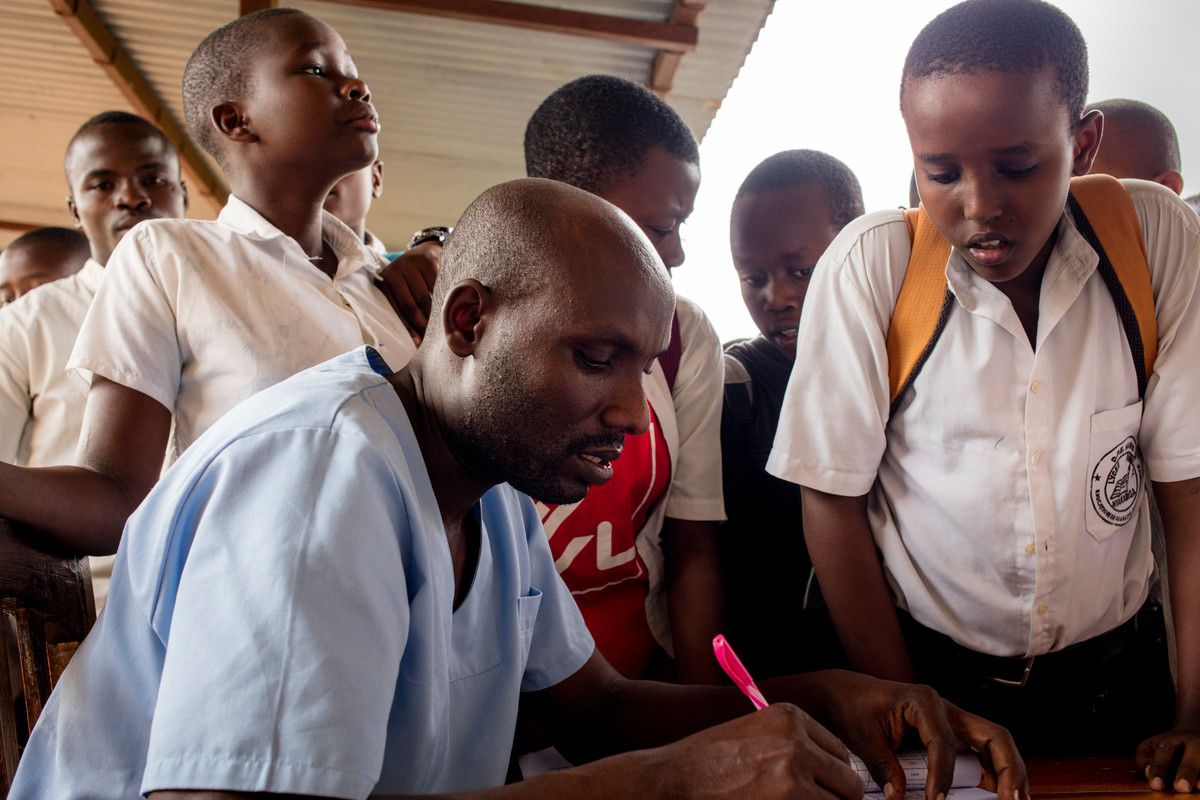
| 22 June 2021
Global Coalition of over 200 groups call for permanent end to Global Gag Rule
A coalition of over 200 international civil society organizations, organized by Planned Parenthood Global and the International Planned Parenthood Federation, released a joint statement today calling for a permanent end to the U.S. global gag rule. The statement — released as part of a week of action to end the global gag rule — was released in Arabic, English, French, and Spanish, demonstrating the diversity of just some of the communities harmed by the rule over the past 37 years. In addition to the over 200 organizations from 88 countries across six continents that signed the statement today — and countless other people around the world — 70% of Americans favor ending the global gag rule. Dawn Laguens, interim executive director, Planned Parenthood Global: “Study after study has demonstrated that the neocolonialist global gag rule devastates health care access for people around the world, especially those who already face systemic barriers to care. And yet, since 1984, the global gag rule has come and gone with each party shift in the White House. President Biden took an important step by ending this harmful rule for now, but real relief will not be felt until we can permanently end this devastating policy. The global community deserves true partnership from the U.S., but the threat that this destructive policy could reemerge undermines relationships and harms people around the globe. We come together today to tell the U.S. government: It’s time to end the global gag rule once and for all.” Dr Alvaro Bermejo, Director-General, International Planned Parenthood Federation: "Since its inception, the global gag rule has been a constant threat to the lives of women and girls and their right to decide what happens to their bodies. Designed to deny people safe and legal abortion care, it has also caused unfathomable damage across the health care spectrum — from HIV prevention and treatment to maternal health care. Our member associations on the front lines of care have witnessed this damage first hand. Whilst we applaud President Biden on rescinding the global gag rule, history has shown us that it is ready to be weaponized by coercive, anti-abortion administrations. We urge the U.S. government to break the violent cycle of the global gag rule permanently, so organizations like IPPF can provide life-saving health care without the fear of our ability to deliver being snatched away from us with the stroke of a pen. Together we can work toward a world where no one is left behind when it comes to their sexual and reproductive health and rights." The global gag rule prohibits non-governmental organizations in other countries from receiving any U.S. global health assistance if they provide, refer, counsel or advocate for legal abortion in their country — even if these activities are supported solely with non-U.S. funds. This cruel policy was originally imposed by the Reagan administration, before being rescinded in 1993 by President Clinton, and then reinstated in 2001 by President Bush on his first business day in office. President Obama rescinded the global gag rule in January 2009, but less than a decade later, President Trump reimposed and radically expanded the policy, extending its harm and devastation to even more women and communities. President Biden then rescinded the gag rule in a presidential memorandum signed on January 28, 2021. Marginalized communities — including women and girls, young people, and LGBTQ+ people — have experienced the most devastating constraints on services as a result of the global gag rule. Tragically, this harm does not fully stop even when the policy is not in effect. According to the joint statement: “The prospect of reinstatement under future administrations casts a long shadow and leaves the health and lives of millions of people vulnerable to the whims of future U.S. presidents… Even when presidents lift the global gag rule immediately upon taking office, high-quality health partners face long delays in resuming participation in U.S. global health programs. Permanent repeal of the policy is urgently needed to promote sustainable progress in global health and to build and maintain long-term partnerships between the U.S. government, local organizations, and the communities that they serve… Urgent action is needed to finally end the global gag rule once and for all and advance health, human rights, and gender equality across the globe.” The full joint statement can be found here and the full list of signatories is below: ABUBEF (Burundi) ACABEF (Central African Republic) Accountability International (South Africa) Action Against Hunger (United Kingdom) Action Canada for Sexual Health and Rights (Canada) Advocates for Youth (United States) Afrihealth Optonet Association (CSOs Network) (Nigeria) AIDOS - Italian Association for Women in Development (Italy) Al Hameed educational society (India) Alliance of Women Advocating for Change (AWAC) (Uganda) Amnesty International (Global) AMPF - Mauritanie (Mauritania) AMPPF (Mali) AnA - Society for Feminist Analyses (Romania) APROSUVI (Guatemala) Asia Catalyst (Thailand) Asia Pacific Alliance for Sexual and Reproductive Health and Rights (Thailand/ Asia Pacific) Asian Pacific Resource and Research Centre for Women (ARROW) (Malaysia) ASSOCIAÇÃO GUINEENSE PARA O BEM ESTAR FAMILIAR (AGUIBEF) (Guinea-Bissau) Associação Para o Planeamento da Família (Portugal) Association Algérienne pour la Planification Familiale (Algeria) Association Béninoise pour la Promotion de la Famille ABPF (Benin) Association Burkinabe pour le Bien Etre Familial (ABBEF) (Burkina Faso) Association Centrafricaine pour le Bien Etre Familial ( ACABEF) Central African Republic) Association Ivoirienne pour le Bien Etre Familial (AIBEF) (Ivory Coast) Association Malienne pour la protection et la Promotion de la Famille (Mali) Association Marocaine de Planification Familiale (Morocco) Association Mauritanienne pour la Promotion de la Famille (Mauritania) Association Nigérienne Pour le Bien Etre Familial (ANBEF) (Niger) Association Tchadienne pour le Bien Etre Familiale (Chad) ASSOCIATION TOGOLAISE POUR LE BIEN ETRE FAMILIAL (ATBEF) (Togo) Association Tunisienne de la Santé de la Reproduction (ATSR) (Tunisia) ASTRA Network (CEE region/ Poland) ATHENA Network (Namibia) Aube Nouvelle pour l Femme et le Développement (Democratic Republic of Congo) Austrian Family Planning Association (Austria) Bahrain Reproductive Health Association (Bahrain) Bandhu Social Welfare Society (Bangladesh) Barnabas Charity Outreach (Nigeria) Botswana Family Welfare Association (BOFWA) (Botswana) Bulgarian Family Planning and Sexual Health Association (BFPA) (Bulgaria) Burnet Institute (Australia) CARE USA (USA) Caribbean Family Planning Affiliation (Antigua & Barbuda) Catalysts for Change (United States) Catholics for Choice (United States) Católicas pelo Direito de Decidir - Brasil (Brazil) Católicas por el Derecho a Decidir - Colombia (Colombia) CEDES - Centro de Estudio de Estado y Sociedad (Argentina) Center for Health, Human Rights and Development (Uganda) Center for Reproductive Rights (USA/ Switzerland/ Global) Centro de Derechos de Mujeres (Honduras) Centro de Promoción y Defensa de los Derechos Sexuales y Reproductivos - PROMSEX (Peru) CHOICE for Youth and Sexuality (Netherlands) CLADEM (Latin America) Corporación MILES (Chile) Danish Family Planning Association (Denmark) Dr Uzo Adirieje Foundation (DUZAFOUND) (Nigeria) DSW (Deutsche Stiftung Weltbevölkerung) (Germany) Economic and Social Rights Centre - Hakijamii (Kenya) Egyptian family planning Association (EFPA) (Egypt) ELA - Equipo Latinoamericano de Justicia y Género (Argentina) Equidad de Género, Ciudadanía, Trabajo y Familia (Mexico) Famia Planea Aruba (Aruba) Family Guidance Association of Ethiopia (FGAE) (Ethiopia) Family Health Association of Iran (Iran) Family Medical Point (Uganda) Family Planning Alliance Australia (Australia) Family Planning Association of Trinidad and Tobago (Trinidad & Tobago) FAMILY PLANNING ASSOCIATION OF MALAWI (Malawi) Family Planning Association of Nepal (Nepal) Family Planning Association Sri Lanka (Sri Lanka) Family Planning New Zealand (New Zealand) Family Planning NSW (Australia) Federación Planificación Familiar Estatal (Spain) Federation of Reproductive Health Associations, Malaysia (Malaysia) Feminist League (Kazakhstan) Feminist Task Force (United States) Fiji Women's Rights Movement (Fiji) FILIA Center (Romania) FLAMA Uganda (Uganda) FPA Sri Lanka (Sri Lanka) Friends Affected & Infected Together in Hand (FAITH) (Nepal) Front Association / Feminism-Romania (Romania) Fundacion Arcoiris por el respeto a la diversidad sexual (Mexico) FUNDACION CEMOPLAF (Ecuador) Fundación Mexicana para la Planeación Familiar, A. C. MEXFAM (Mexico) Fundacion para estudio e investigacion de la Mujer (Argentina) Fundación Pro Salud Sabana Yegua FUNPROSSY (Dominican Republic) Futures Without Violence (United States) Gestos _HIV, Communication and Gender (Brazil) Girl Up Initiative Uganda (Uganda) Global Network of Women Peacebuilders (United States) GreeneWorks (United States) Grupo Multidisciplinario para la Defensa de los derechos sexuales y reproductivos en Guatemala (Guatemala) Guttmacher Institute (United States) Hábitat Mujer Salud (Colombia) Haiti Adolescent Girls Network (Haiti) Health, Ethics and Law Institute of Forum for Medical Ethics Society (India) Heartland Alliance International (United States) Hesperian Health Guides (United States) HIV Legal Network (Canada) Human Rights Awareness and Promotion Forum (HRAPF) (Uganda) INPPARES (Peru) International Action Network for Gender Equity & Law (IANGEL) (United States) International Campaign for Women's Right to Safe Abortion (United Kingdom/ Global) International Center for Research on Women (ICRW) (USA) International Federation of Gynecology and Obstetrics (United Kingdom) International Planned Parenthood Federation East and South East Asia and Oceania Region (ESEAOR) (Malaysia) Ipas (United States) International Planned Parenthood Federation (Global) Irish Family Planning Association (Ireland) Israel Family Planning Association (Open Door) (Israel) Jamaica Family Planning Association (Jamaica) John Snow, Inc. (JSI) (United States) JOICFP (Japanese Organization for International Cooperation in Family Planning) (Japan) Kenya Legal & Ethical Issues Network On HIV & AIDS (Kenya) Kenya Medical Association (Kenya) Kisumu Medical and Education Trust (KMET) (Kenya) Kyetume Community Based Health Care Programme (Uganda) L’ASSOCIATION DJIBOUTIENNE POUR L’EQUILIBRE ET LA PROMOTION DE LA FAMILLE (Dijibouti) Latin American and Caribbean Womens Health Network (Latin America and the Caribbean) Le Planning familial (France) LI PRIDE (Liberia) Lobi Health Center Foundation (Suriname) LUNA vzw (Belgium) Marie Stopes International (Global) MSI Reproductive Choices (United Kingdom) Mujer Y Salud en Uruguay - MYSU (Uruguay) Network for Adolescent and Youth of Africa (Kenya) Observatorio de la Gobernanza para la Cooperación y el Desarrollo A.C. (Mexico) OutRight Action International (United States) Palestinian Family Planning and Protection Association (PFPPA) (Palestine) Pathfinder International (United States) Plan International (United Kingdom) Plan International USA (United States) Plan International, Inc (Global) Planned Parenthood Association of Ghana (Ghana) Planned Parenthood Association of Thailand (Thailand) Planned Parenthood Association of Zambia (Zambia) Planned Parenthood Federation of Nigeria (Nigeria) Planned Parenthood Global (Global) Profamilia (Colombia) Queensway Institute of Technology and Business Studies (Kenya) Raks Thai Foundation (Thailand) RAWSA MENA NETWORK (Tunisia - for the MENA region) Red de Salud de las Mujeres Latinoamericanas y del Caribe (Latin America and the Caribbean) Red Latinoamericana y Caribeña de jóvenes por los Derechos Sexuales y Derechos Reproductivos REDLAC (Mexico) REDAAS - Red de Acceso al Aborto Seguro Argentina (Argentina) Regional Centre for International Development Cooperation (RCIDC) (Uganda) Reproductive Health Network Kenya (Kenya) Reproductive Health Training Center/Regional SRHR Coalition for EECA (Moldova/ Eastern Europe and Central Asia Regions) RFSU (Sweden) RHAC (Cambodia) Rutgers (Netherlands) SANTE SEXUELLE SUISSE (Switzerland) SCI Foundation (United Kingdom) Sendas (Ecuador) Sensoa (Belgium) SERAC-Bangladesh (Bangladesh) Sex og Politikk (IPPF Norway) (Norway) SEXUL vs BARZA / SEX vs The STORK Association (Romania) SFBSP-BURUNDI (Burundi) Society for Conservation and Sustainability of Energy and Environment in Nigeria (SOCSEEN) (Nigeria) Solidarity Sisters Network of Liberia (SoSNoL) (Liberia, West Africa) Solomon Island Planned Parenthood Association (Solomon Islands) Somaliland Family Health Association (Somaliland) Soroptimist International (United Kingdom) Space Allies (Japan) Stichting EqualA Foundation (Netherlands/ Thailand) Stichting Ultimate Purpose (Suriname) Stop AIDS in Liberia (SAIL) (Liberia) SUDAN Family Planning Association (SFPA) (Sudan) Sukaar Welfare Organization (Pakistan) Support for Women in Agriculture and Environment (SWAGEN) (Uganda) Syrian Family Planning Association (Syria) TAN UX´IL (Guatemala) TDJ-BURUNDI (Burundi) Teens Link Uganda (Uganda) The African Women's Development and Communication Network (FEMNET) (Kenya) The Lebanese Association for Family Health- SALAMA (Lebanon) The Lesbian and Gay Association of Liberia (LEGAL) (Liberia) The Society for Education on Contraception and Sexuality from Romania (Romania) Together for Girls (United States) Trust for Indigenous Culture and health (TICAH) (Kenya) Universal Access Project (United States) Urgent Action Fund for Women's Human Rights (United States) Vidhayak Trust (India) WGNRR AFRICA (Tanzania) William and Flora Hewlett Foundation (USA) Women Deliver (USA) Women Enabled International (USA) Women's Global Network for Reproductive Rights (WGNRR) (Philippines) Women's Link Worldwide (Global) Women's Major Group (Global) Women's Refugee Commission (USA) Women’S Way Foundation Suriname (Suriname) Woodhull Freedom Foundation (United States) Yemeni Association for Reproductive Health (Yemen) YouAct - European Youth Network on Sexual and Reproductive Rights (United Kingdom) Young Feminist Europe (Belgium) Youth Association for Development (Pakistan) Youth Coalition for Sexual and Reproductive Rights (YCSRR) (Canada) Planned Parenthood is the nation’s leading provider and advocate of high-quality, affordable sexual and reproductive health care for all people, as well as the nation’s largest provider of sex education. With more than 600 health centers across the country, Planned Parenthood organizations serve all patients with care and compassion, with respect, and without judgment, striving to create equitable access to health care. Through health centers, programs in schools and communities, and online resources, Planned Parenthood is a trusted source of reliable education and information that allows people to make informed health decisions. We do all this because we care passionately about helping people lead healthier lives. Planned Parenthood Federation of America (PPFA) is a 501(c)(3) charitable organization that supports the independently incorporated Planned Parenthood affiliates operating health centers across the U.S. For 50 years, Planned Parenthood Global has supported access to sexual and reproductive health care and advocated for reproductive rights around the world. In partnership with nearly 100 organizations across nine focus countries in Africa and Latin America, we advance the health and rights of young people, women and families, with an emphasis on the most vulnerable and underserved. Each year, our partners provide sexual and reproductive health information and services to nearly 2 million people. Our unique sustainability model sets us apart, as we empower partners to stand on their own. We help grassroots organizations develop solid reproductive health programs, identify other sources of funding, build their communications and advocacy skills, and develop strategic plans. Planned Parenthood Global is the international arm of Planned Parenthood Federation of America. The International Planned Parenthood Federation (IPPF) is a global service provider and advocate of sexual and reproductive health and rights for all. For over 65 years, IPPF through its 118 Member Associations and 15 partners, has delivered high-quality sexual and reproductive healthcare. and advocated for the advancement of sexual rights. Our Member Associations and partners are independent organizations that are locally owned, which means they can deliver care and advocate for sexual and reproductive rights, informed by local context and expertise, especially to the vulnerable and the under-served. We advocate for a world where people are provided with the information, they need to make informed decisions about their sexual health and bodies. We stand up and fight for sexual and reproductive rights, and against those who seek to deny people their human right to bodily autonomy and freedom. We deliver care that is rooted in rights, respect, and dignity — no matter what.
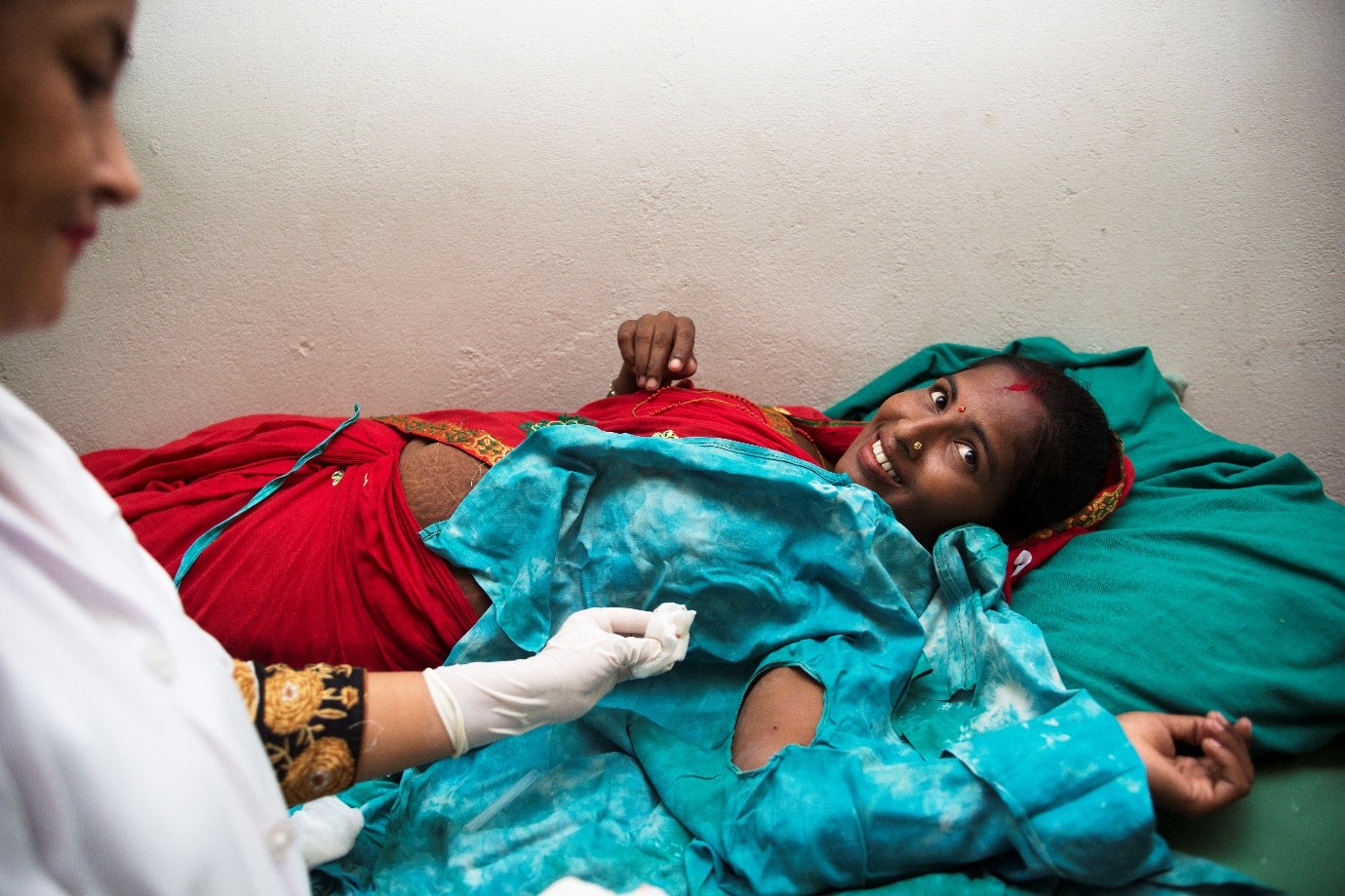
| 17 June 2021
IPPF welcomes funding support from Australia for Asia Pacific COVID-19 SRHR Initiative
The International Planned Parenthood Federation (IPPF) is delighted to announce a new collaboration with MSI Reproductive Choices for the Asia Pacific. Funded by the Australian Government, the two organizations will deliver a two-year program, Responding with Essential SRHR Provision and New Delivery Mechanisms (RESPOND). The AU $33.4 million initiative, commencing July 2021 and running to the middle of 2023, will support IPPF Member Associations and MSI Country Programs to respond to the additional sexual and reproductive health needs of communities affected by the COVID-19 pandemic in 22 countries. IPPF’s Director General, Dr Alvaro Bermejo, welcomed the news: “The impact of the COVID-19 pandemic has been devastating in many countries across the Asia-Pacific, especially on the lives of women and girls, who have been disproportionately affected by the uneven burden of caring responsibilities, increases in gender-based violence, and reduced access to sexual and reproductive healthcare. “If the world is to build back better after the coronavirus pandemic and achieve greater gender equality, high-quality sexual and reproductive healthcare must form an essential part of any effort. It is fantastic to work with a long-standing partner like DFAT that recognises this. “We are immensely grateful for the Australian government’s unwavering support so that IPPF, alongside our partners at MSI Reproductive Choices, can continue providing life-saving sexual and reproductive healthcare both during the pandemic and beyond.” Simon Cooke, CEO at MSI Reproductive Choices, said: “Giving women and girls the power to make reproductive choices is one of the smartest global investments, costing less than 2 pence per day to protect a young woman from an unintended pregnancy, giving her the chance to stay in school, forge a career, or even save her life. “However, during the Covid-19 pandemic, millions of women and girls around the world have had access to sexual and reproductive health and rights stripped as these essential services have been deprioritised. When women are faced with crises, the need for reproductive choice has been shown to rise, at the very time that access falls. “We are delighted to be working in partnership with DFAT and IPPF to protect access to life changing and life-saving services when they are needed most and are grateful to the Australian government for their leadership in prioritising this within their Covid-19 response.”
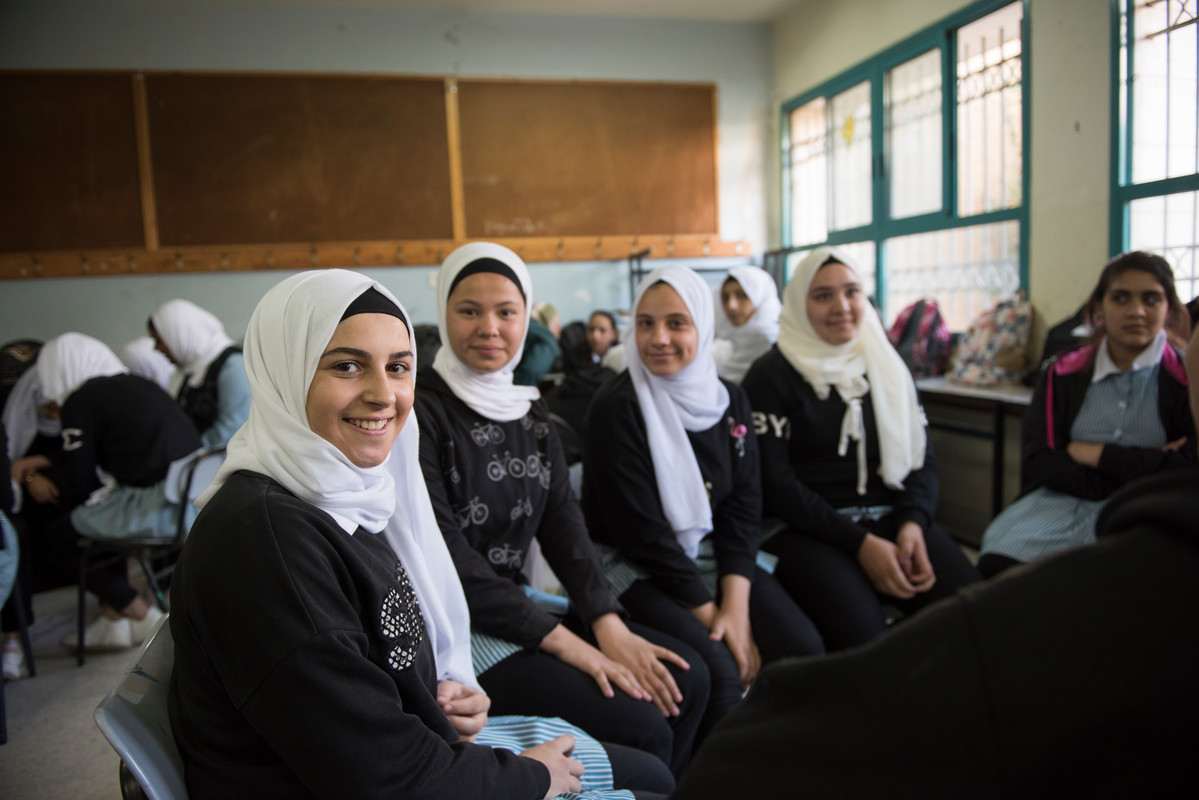
| 11 June 2021
IPPF hosts G7 SRHR Ministerial Roundtable
IPPF hosted a G7 Ministerial Roundtable entitled Empower Women and Girls, Empower Humanity: Bodily Autonomy and Sexual and Reproductive Health and Rights (SRHR). The roundtable facilitated a meaningful dialogue on the importance of keeping SRHR commitments that G7 countries have made to the women and girls left behind, ensuring that SRHR and bodily autonomy are central to reaching Universal Health Coverage (UHC) and the Sustainable Development Goals (SDGs). The roundtable was sponsored by Foreign Commonwealth and Development Office United Kingdom (FCDO) and Global Affairs Canada, with participants from UK, Germany, USA, France, Japan, Canada, Australia, India, and South Africa. Karina Gould, Minister of International Development for the Government of Canada said: “It is more important than ever to ensure that women and girls have control over their bodies, and do not face additional vulnerabilities, discrimination and violation of their rights. We need to see an integrated effort to better enable our health systems to respond to the pandemic while continuing to address the needs of women and their families.” Keiichi Ono, Assistant Minister and Director-General for Global Issues for the Japanese Ministry of Foreign Affairs added: “COVID-19 has exacerbated the plight of vulnerable people. Reaching the most vulnerable people first is key to realizing universal health coverage and to ensuring an effective gendered response to COVID-19 that includes Sexual and Reproductive Health and Rights.” IPPF would like to thank those who contributed to the invigorating and inspirational event, and we look forward to continuing our collective push in ensuring bodily autonomy and SRHR remain central to UHC and the SDGs.








